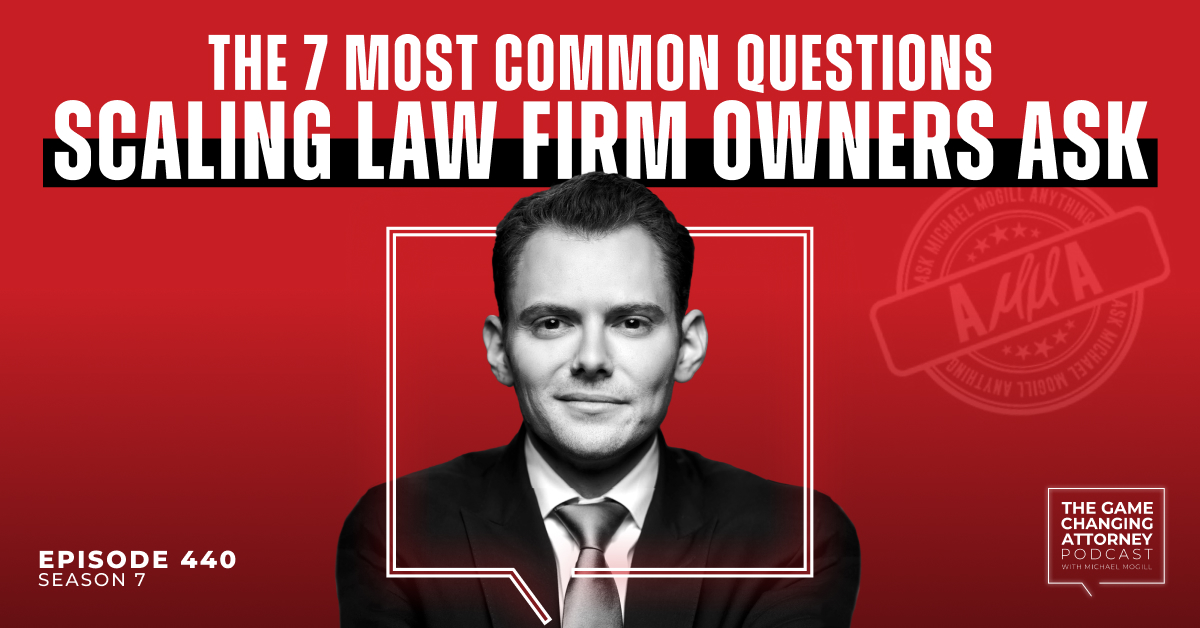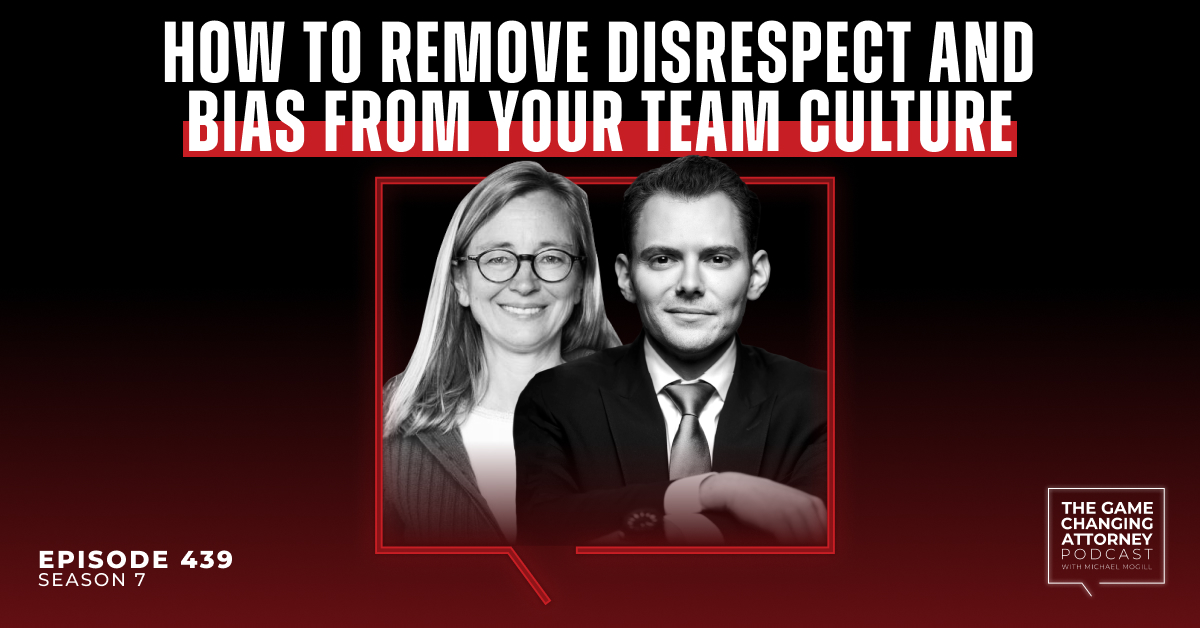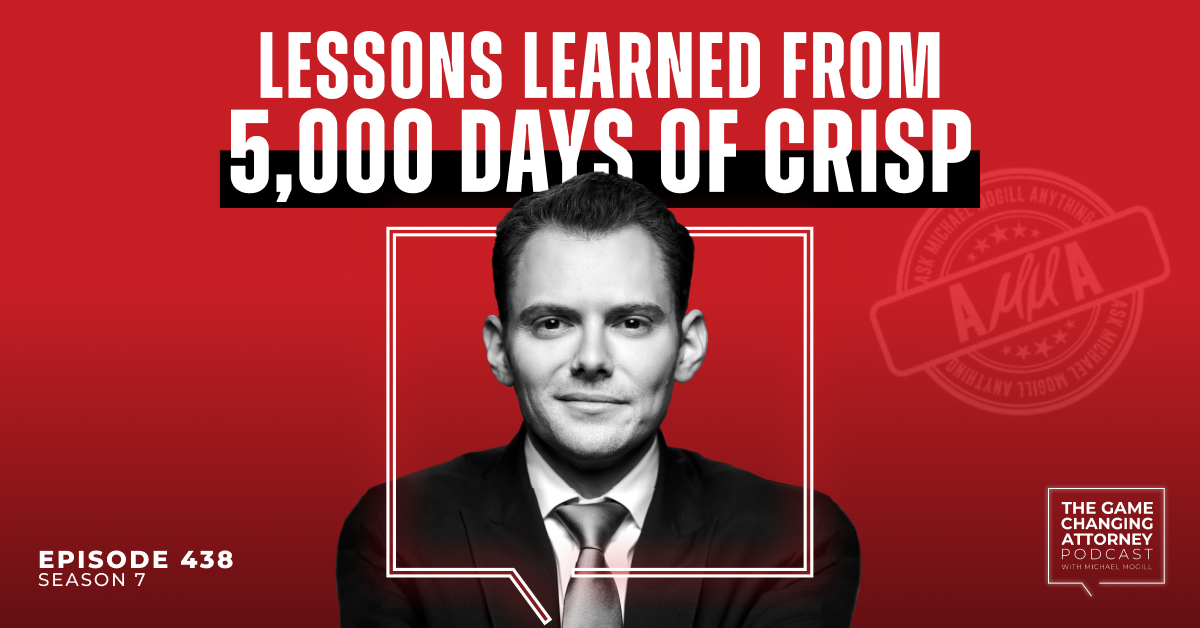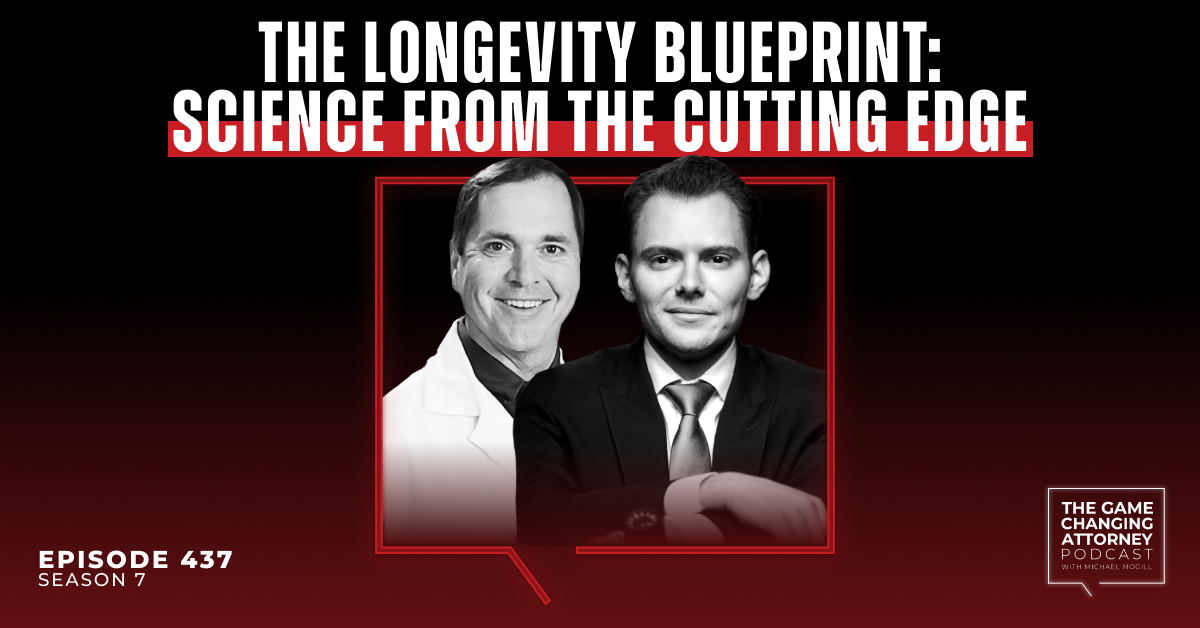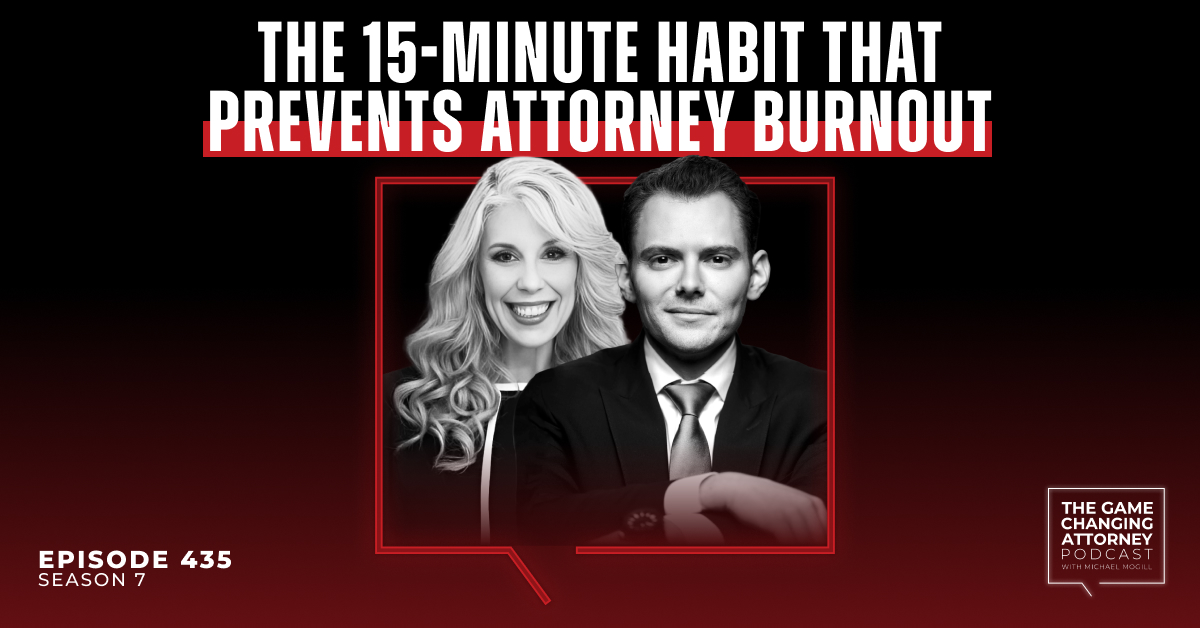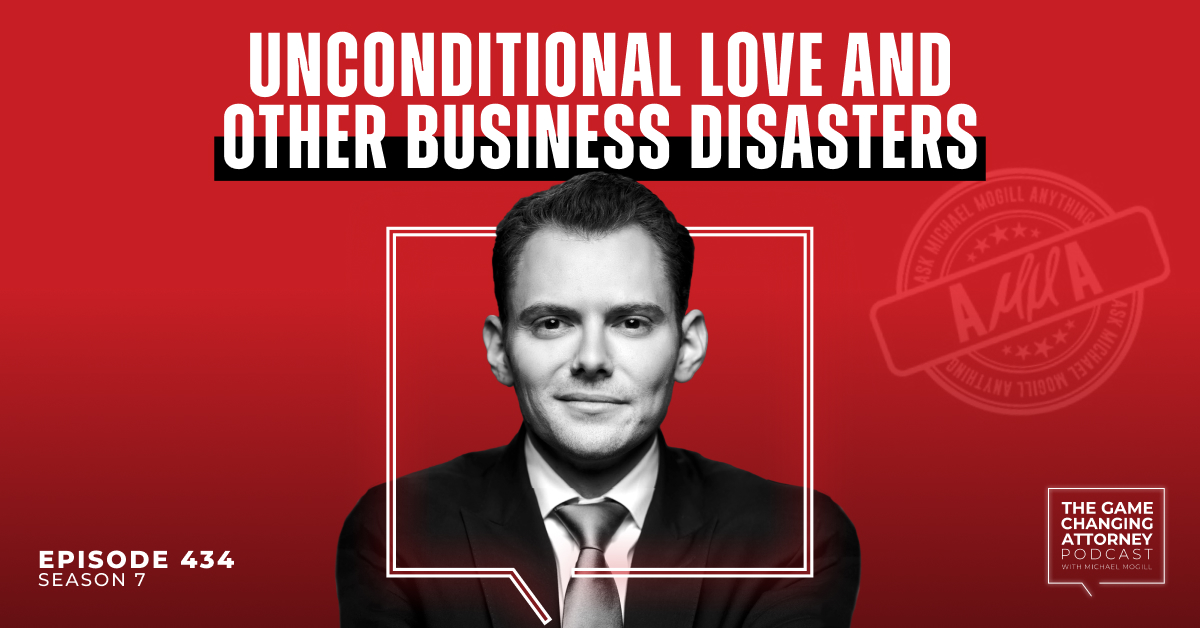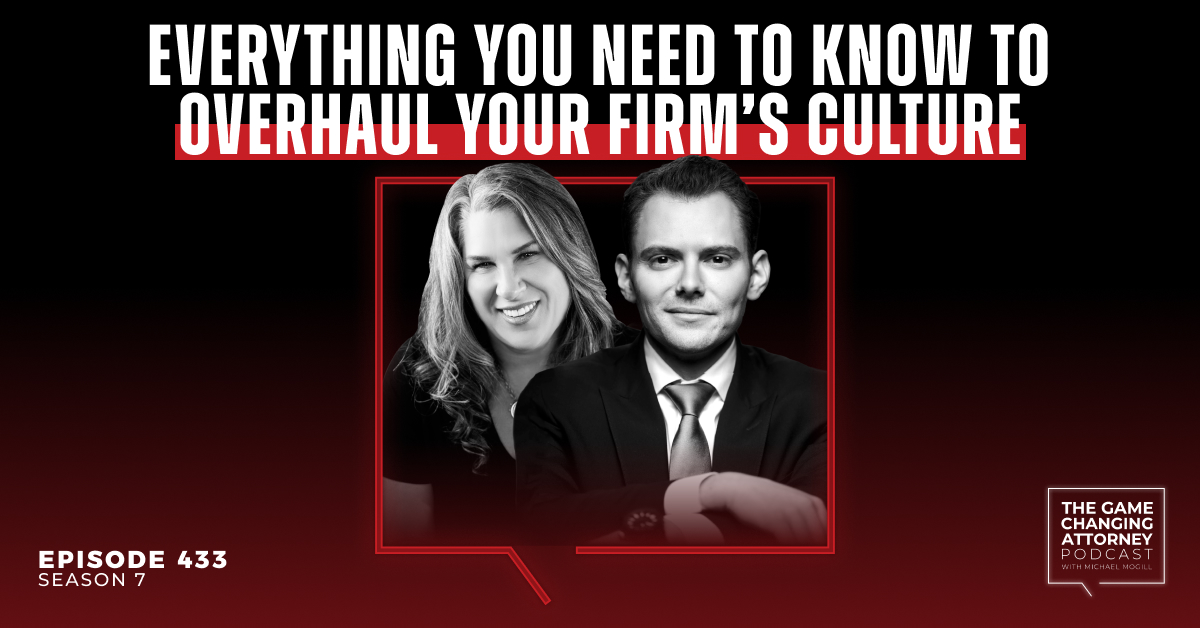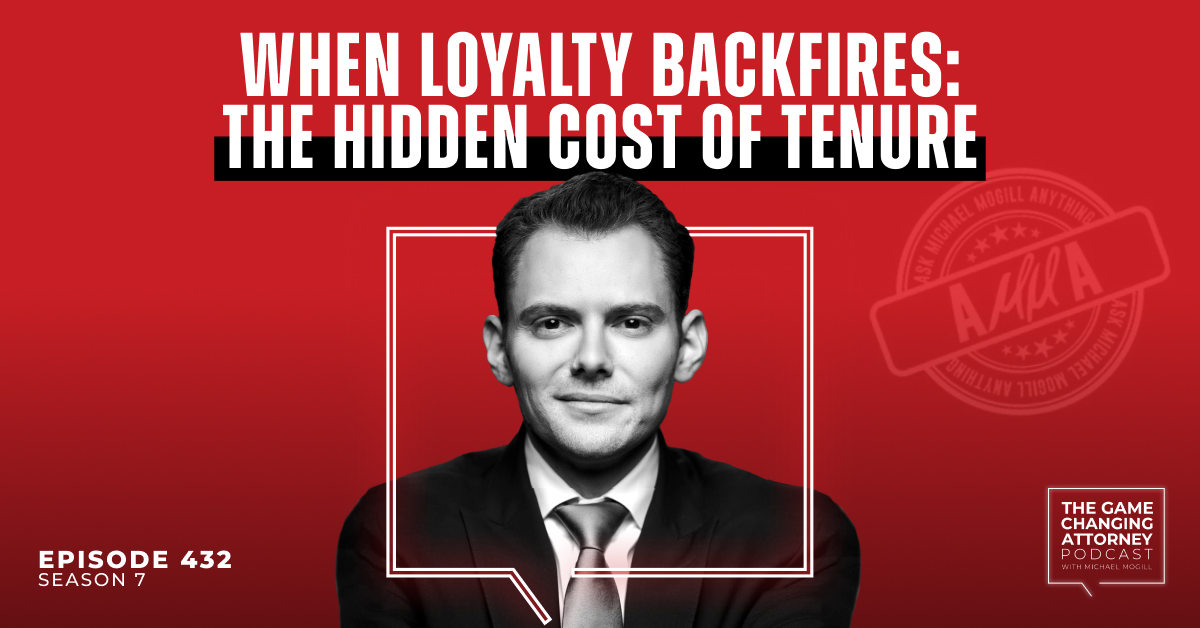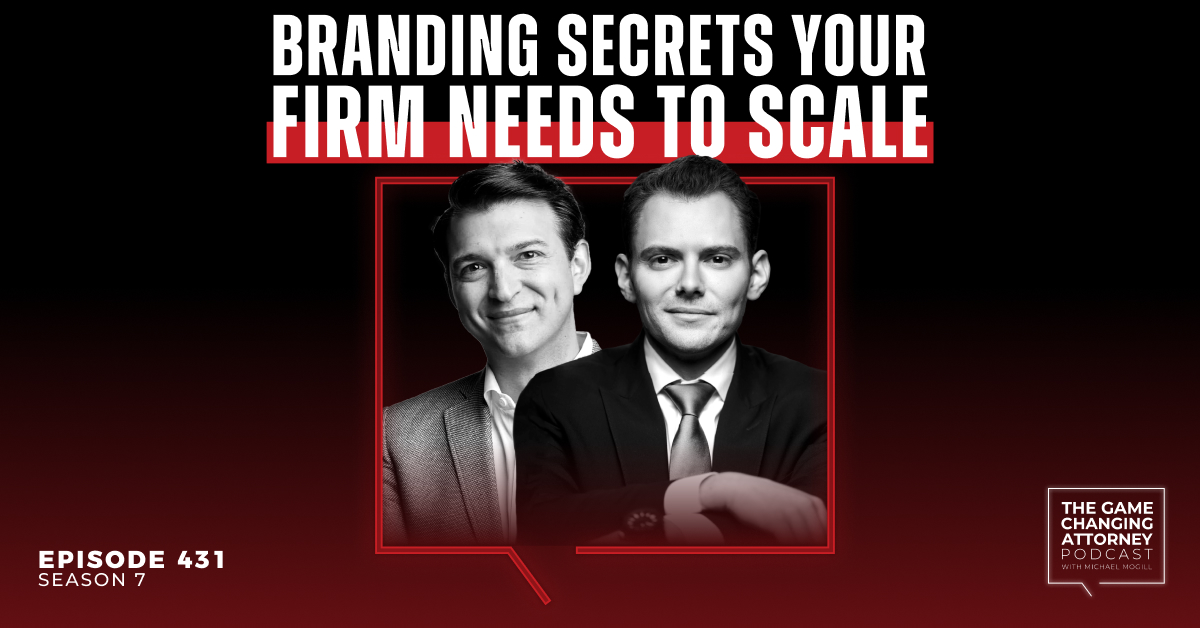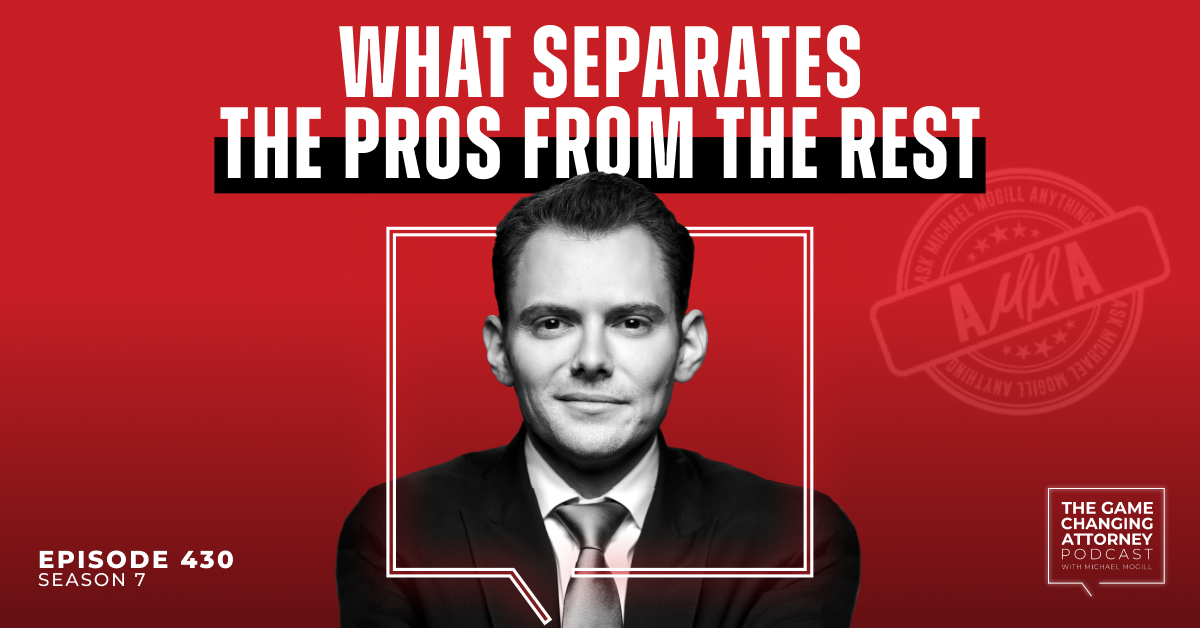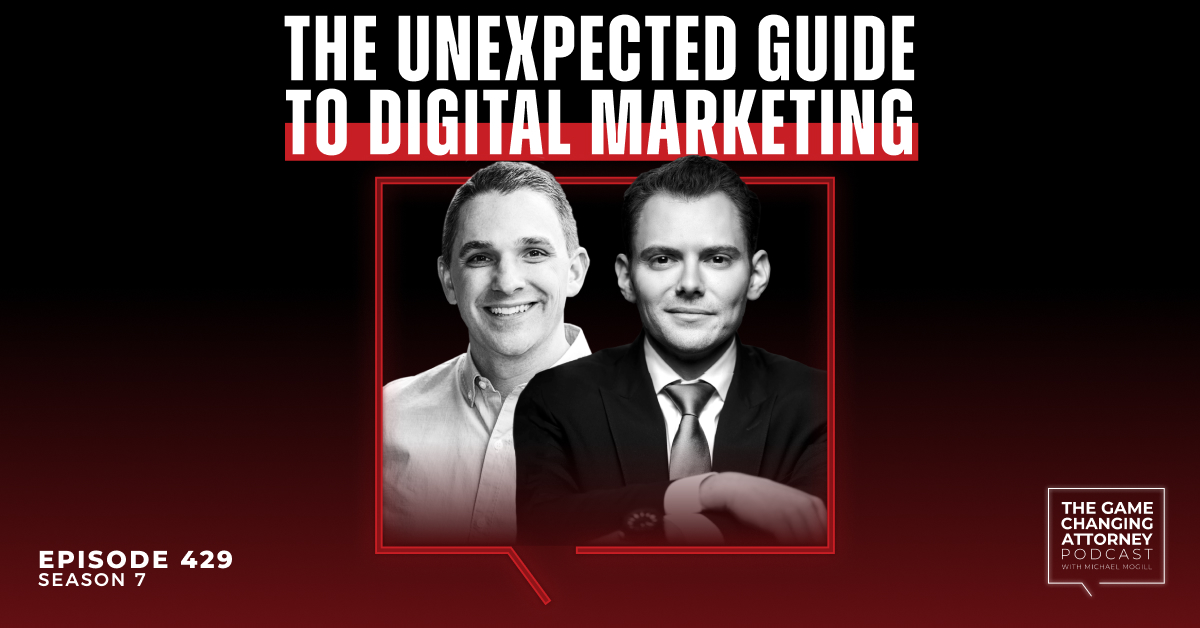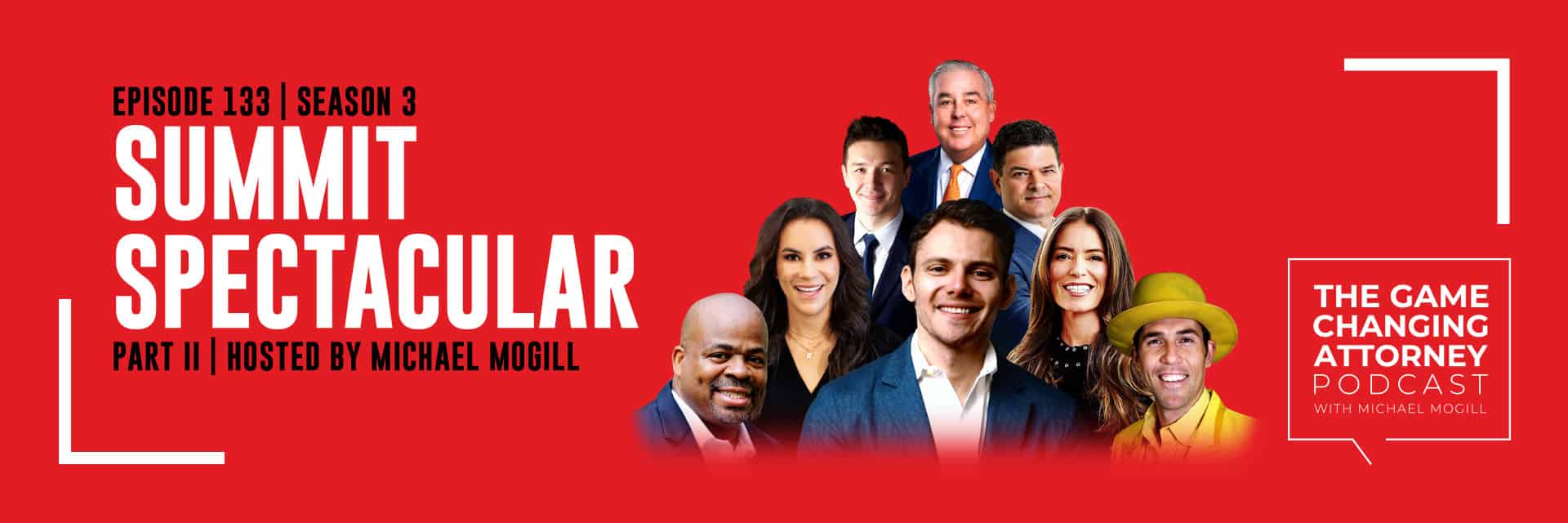
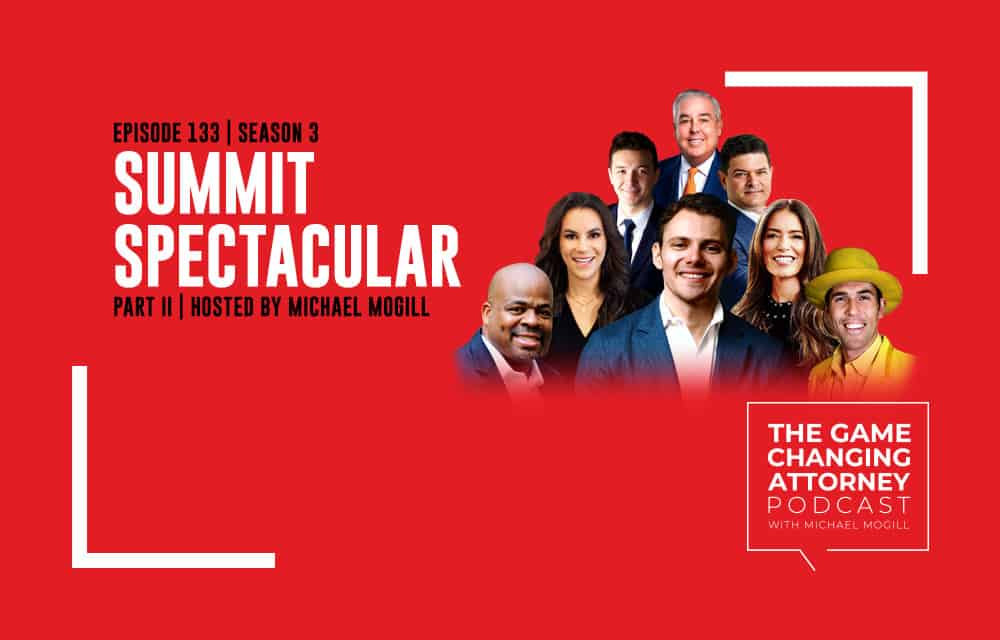
Episode 133 — Summit Spectacular: Part 2
The Game Changers Summit 2022 is officially in the books, and a great time was had by all 5,000+ law firm owners in attendance. But just because the Summit itself is over doesn’t mean that we’re done talking about it.
Welcome to Part 2 of the Summit Spectacular on The Game Changing Attorney Podcast. Take a look back on some of these iconic episodes from some of our featured speakers, such as:
- Andre Norman, Author & Founder of Academy of Hope
- John Morgan, Founder of Morgan & Morgan, America’s Largest Injury Firm
- Laura Wasser, Entrepreneur & Elite Divorce Attorney
- Jesse Cole, Founder of the Savannah Bananas
- Jessica Mogill, Head of Coaching Strategy at Crisp
- Anthony Johnson, America’s Techiest Lawyer
- Joe Fried, Renowned Trucking Attorney at Fried Goldberg
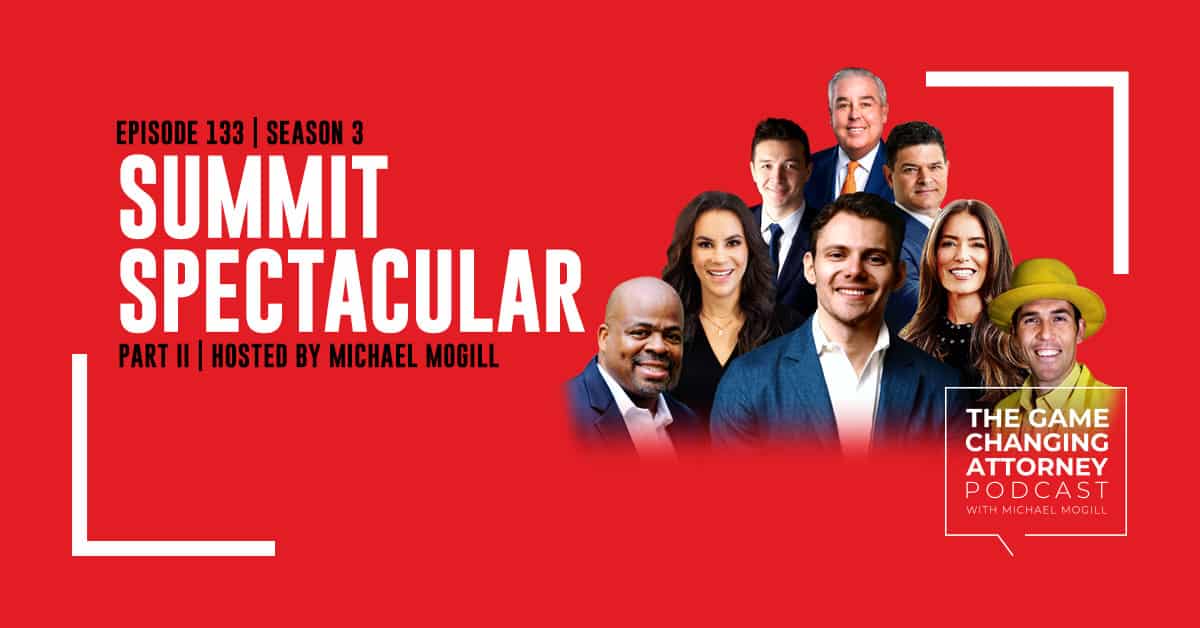
Listen & Subscribe
Show Notes:
Andre Norman
A place you don’t want to be. “Maximum security prison is another world entirely. It’s scary — there’s no other way to describe it. If it’s your first time there, you should be scared to death. People get raped, beaten, stabbed, and tortured daily. When I first got there, I was terrified. They called in a caseworker who sat down with me and told me that I could make my time spent there work for me. The second she left, I knew I would sign up for my GED. But when I told my friends, they told me I was crazy — that I would be a loner, and a white gang would take advantage of that. You can’t beat the mob. So I went out to the [prison] yard instead of getting in line for my GED.”
Healthy choices. “I made a decision in prison: I was going home, I was going to Harvard, and I was going to be successful. My friends wanted to laugh at me, but I’d threatened to stab people, so no one laughed. One of them said I couldn’t go to Harvard because I was black, a criminal, and a gang member. I knew that. He kept telling me all the reasons why I couldn’t go to Harvard, and I realized I was on my own. So I stood in front of the mirror and asked myself, ‘What’s inside of me that’s stopping this dream from happening?’”
Harsh realities. “I told young black kids who looked just like me, ‘You’re going to jail — but not because you’re black, or because you picked up a gun, or because you smoked weed. You’re going to jail because someone let you down and it hurts. You act out. At eight or nine years old, it’s cute. At 14 or 15, it’s criminal.’”
John Morgan
We can learn a lot from paperboys. “I’ve always been fascinated with paperboys. They’re 10 or 11 years old, and they’re tied to this job every day. Rain, sleet, snow, grouchy customers, bad customers, but they do it every single day. I believe those paperboys are lions. Warren Buffett was a paperboy. Oprah Winfrey was a papergirl. When I meet people, especially my age, I ask them if they were a paperboy or a papergirl. And when they tell me they were, it’s like my own little Myers–Briggs personality test. I know who I’m dealing with.”
The common denominator of success. “Some mules can plow all day long and some mules don’t do anything. The secret to success is not brains; it’s the willingness to work. Everybody that I know who is very successful has been a hard worker. When I look around my firm or around the offices in America, the most successful people are the people working on the weekends. The common denominator: the most successful people in my life have been the hardest working.”
Seek those with an insatiable appetite. “Almost everybody has a limit of satiability. But then there’s that rare breed that has an insatiable appetite. No matter what they have, they want more. It’s not about money. It’s about winning. It’s about succeeding. It’s about being respected. I’m always looking for those people who have that insatiable appetite — that they’re never going to stop because they want to be successful, respected, and revered.”
Laura Wasser
There’s got to be a better way. “If 50 percent of marriages end in divorce, isn’t it incumbent upon us to figure out a way to do it better so that it’s not such a pain for everyone involved? We need to figure out a better way of doing it rather than the old fashioned way like we see in movies. Breakups are going to be hard no matter what, but legislatively, administratively, and financially, there has to be a better way of doing it.”
We love love. “It’s human nature for us to fall in love. We lock into whatever’s the most secure and protected feeling we can find. After a certain period of time, though, there’s always going to be downfalls. I’ve found that couples who figure out a way to communicate and build skills before they move in together and get married are the ones who can weather the storm. When things get bad, they can go into their toolbox and use the skills to help them.”
The stars are just like us. “Celebrity cases aren’t so different from non-celebrity cases. I always say that divorce is the great equalizer, and while yes, celebrities tend to have more money than the average person, they’re just not as dissimilar as one might think. The biggest change is the media and trying to keep things private for the benefit of the family. Celebrities also often have many people with whom they surround themselves, and their jobs are typically to say yes, but that’s not my job. I have to say no sometimes, even if they may not like it.”
Jesse Cole
Stand out to show out. “If you really want to stand out, you’ve got to do the opposite of what everyone else is doing. In the beginning, I treated the team as a regular baseball team, and it just wasn’t working. Today, the Savannah Bananas are completely focused on the ‘fans first’ mentality. We have a dance team, an all-male cheerleading team, breakdancing coaches, baby bananas, players in stilts, and so much more — and every single bit of it stems from the idea of putting our fans’ needs first.”
Buy me some peanuts and Cracker Jack. “I used to have a love for baseball, but now I have a love for baseball for what it could be. I don’t love the current game of baseball, but growing up and living with my dad, our one bond was going to the baseball field every day after school to work. He built a mound in my backyard so I could pitch. I fell more in love with it each day, until I realized that watching the game wasn’t nearly as rewarding as playing it. That’s how 15 years of experimentation developed to see what would make the game more fun to watch.”
Going bananas. “The team’s name ‘The Savannah Bananas’ came from not wanting to be like every other team. We didn’t want an animal-themed name. We wanted to stand out. We held a contest open to the public to help decide on the name. It wasn’t until a 62-year-old nurse submitted ‘Bananas’ as a team name idea, and from that moment on we were throwing out ideas and rhyming words and having a blast. We knew we would get criticism for it, which is why we prepared for two whole days on how to deal with it — and we needed it. When we revealed our team name, we got nothing but criticism for days.”
Jessica Mogill
An ideal duo. “I think anyone who works together really closely needs to be able to complement each other while not being the same. At Crisp, we use tons of assessments, and whether people are visionaries or they’re more operationally structured, we know that we need variety there. I think also a really important aspect is the fact that you love sales and marketing so much. You’re a sales and marketing visionary, but I didn’t want that. I think something about a person in this position is that they have to really be okay being number two. They have to actually love being number two. I don’t envy you or anything that you do every day.”
Building a business with your spouse. “It is not for the faint of heart. It is not for everyone. I would actually say really look deep inside your soul if you are ever considering this. Again, you and I never had the intention of this spanning across many years. We thought it was going to be for 30 days, but there’s a lot to this. I think the pro, of course, is that you’re not going to trust anyone as much as you would like your significant other — being in the business and being the one running payroll, or being the one who’s mindful of budgets and how much money you’re spending, and all of that. But at the same time, there has to be some level of separation, and I will admittedly say that before we had a child, that separation was pretty non-existent.”
Teamwork makes the dream work. “Everyone has off days. Everyone has low days, high days, whatever that might be. We have this understanding in terms of morale or whatever you want to call it, that we both can’t be down at the same time. That’s one thing, in terms of whether it’s at home, it’s at work, or anything — one of us has to be the stronger one who’s able to carry things through, because sales and marketing and operations is just this little circle of things, and there’s always a place that needs attention. So one of us is always more stressed than the other.”
Anthony Johnson
Becoming America’s Techiest Lawyer. “It was like my first or second year of practice. It goes to show kind of how the industry is too. What happened was, there was somebody that submitted me for this American Bar Association “Top Techiest Lawyers in America” list. And I think the premise of my submission was something around how we were completely cloud-based. We had cloud phone systems. We were all digital files. We were a paperless office. So the bar in 2013 — maybe 2012, whenever that was — to be one of America’s techiest lawyers, it just dawned on me how relatively low it was. Either that, or I just didn’t think I was deserving to be it at that time. It’s amazing how far we’ve come since then, but I guess that as a moniker is not a bad brand to get early on.”
It’s about what you do with the data. “So the fact that they had quantitative data is not that helpful — it’s whenever you have quantitative data, your ability to architect understanding and to structure data and information in a way that you can test that feedback loop. So you throw the information through it, you see if you’re right or not, and you can incrementally iterate proving out this architecture. That’s what quantity is for, because once the data is out on the internet, whether it’s Facebook or Google or whatever — once you can digest the data, your understanding is exponential, because all the data lives on the internet. It’s not that hard to get. That’s kind of how I approach it. It’s about really architecting this fundamental understanding of how data works and how we can use the information we’re getting at a certain bandwidth in order to iterate that feedback loop, improve it, and then try some curated kind of stress test version of what data should look like in the industry. And then convince everybody else to use it, which is actually the easy part.”
Changing the rules. “There’s no way to play by the rules of that game — the centralized game. There’s no way to beat Facebook at being the best social media company or the most used one. It’s just too late. They’re too big. So the only way to disrupt that industry is to kind of change the rules. And the only way to change centralized databases and the ownership of data in the way it’s structured today is to figure out a way to start siphoning that data into a new world — whether it’s decentralized or quantum databases or something like that — to where it can build on itself. So the only way to truly regulate something as large as the internet is to get everyone access to it in the same way, and then let it curate itself and self-organize.”
Joe Fried
A place to make a difference. “To me, sitting in a courtroom was like sitting in a hallowed place. I was a police officer starting when I was 19 years old, so I was pretty young. Even at a very young age, I felt that important things happen here. I also saw with my own two eyes that justice is not equal at all. Justice is not blind at all. Despite our affirmation that it will be, it’s not — and one of the big difference makers is the lawyer. So I saw that as a place that I should go, a place that I could make a difference.”
His first trucking case. “This lady with a far-off voice started to talk to me and said, ‘Is this Joe Fried?’ I said, ‘Yes ma’am. Hello. Can I help you?’ And she said, ‘At three o’clock this morning, my husband was killed. I don’t know what happened, but I know that he got hit by a truck.’ I thought, really — I mean, this seems like weird stuff, man. Like, did I cause this? So I asked how she knew to call me, and she said, ‘I don’t really know how I have your name,’ but she called me. I mean, I don’t know if somebody in law enforcement gave her my name. I probably had a website, but it certainly wasn’t a trucking website. And of course, I said, ‘Well, don’t talk to anybody else. I’m on my way to come see you.’ And right about that time my one staff person came in and I said, ‘We’re now a trucking firm.’”
An addiction to hard work. “I think that that fear makes us go down different paths, and for some people fear drives them to drugs, alcohol, reclusiveness, and failure. For others, it drives them to be a different kind of addict, one that goes to work every day, on weekends, and spends 15 hours a day. As you look at those things, it’s an addiction also.”
RESOURCES & REFERENCES
Game Changers Summit
Crisp
Harvard University
Morgan & Morgan
Wasser, Cooperman & Mandles
The Savannah Bananas
Attorney Group
Fried Goldberg, LLC
Connect with Michael
- Text directly at 404-531-7691
